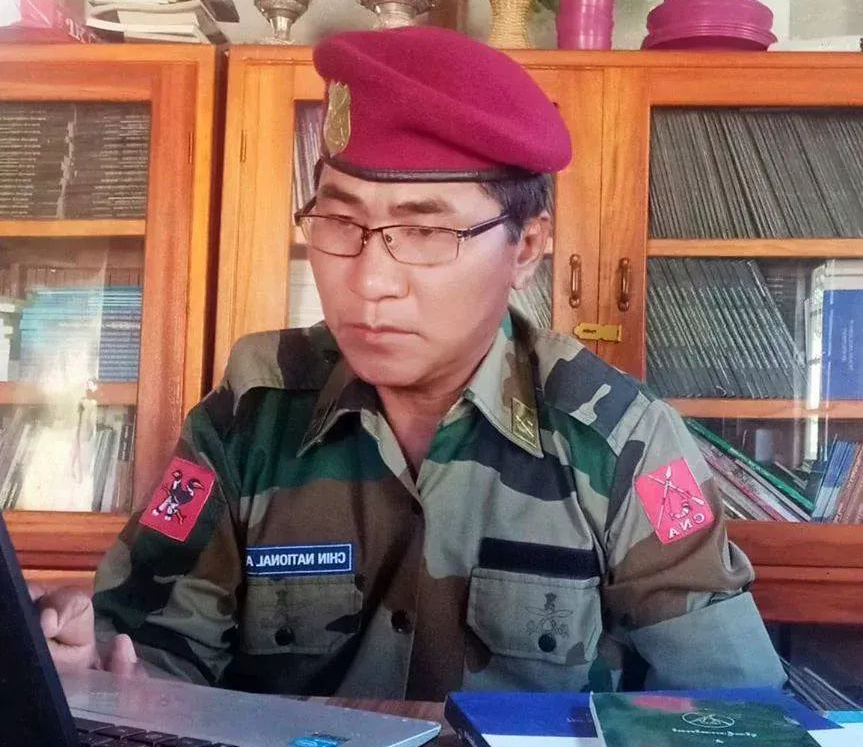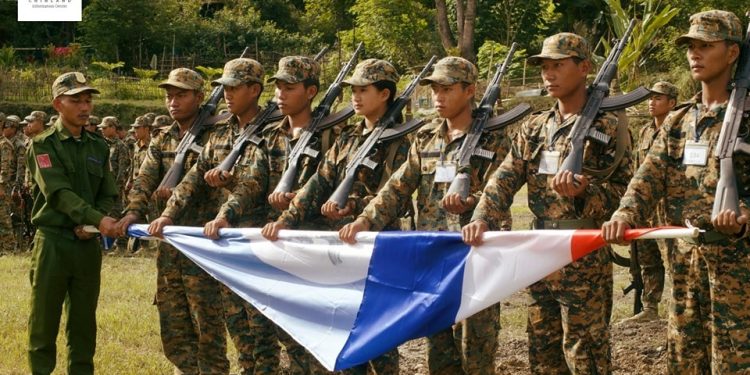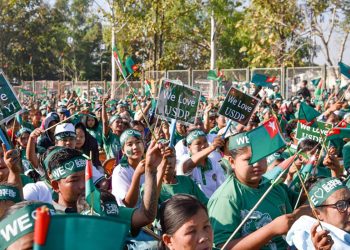Chin State rose in revolt against the regime in April 2021, just two months after the military coup, and has been at the forefront of the Spring Revolution since then. Even though the junta imposed martial law in seven of the state’s nine townships, its presence is limited to towns, while ethnic Chin resistance forces control most of the territory in the state.
After the Brotherhood Alliance launched Operation 1027 in northern Shan State on October 27, fighting escalated in Sagaing Region, Kayah, Rakhine and Chin states. On November 13, ethnic Chin forces led by the Chin National Front (CNF) seized Rihkawdar Town on the Myanmar-India border.
CNF spokesman Salai Htet Ni recently talked to The Irrawaddy about the escalating fighting in Chin State. Although he said he was sure that the resistance would prevail, he described regime boss Min Aung Hlaing as a “wounded tiger,” saying he would do anything to save face.
What was the motive for seizing Rihkawdar?
We have started to seize towns because [this] is part of the military strategy of ethnic armed organizations and every other organization participating in the Spring Revolution. We seized towns to remove the administrative mechanism of the regime.
The fact that [EAOs] in both northeastern and southeastern Myanmar are doing so [shows they are] implementing a military strategy in harmony.
We seized Rihkawdar partly because it is a trade town on the border with India [that] serves as a source of income for the regime.

What is the current situation in Rihkawdar?
We have taken total control of the town. We took measures [to allow] people to return to the town. People have started to return … We have to install a civilian administrative body and ensure public safety. As the town is a border trade town, we are working to ensure the safety of the border trade route.
What is your assessment of the morale of junta soldiers now?
[It] is at a low level. They are badly demoralized. Some soldiers feel that they are only fighting to protect the interests of a handful of [people in the] upper echelon of the regime. The regime is providing little support for its troops in the Chin Hills. They are in chaos. Junta soldiers from the rank of battalion commander and below are feeling [demoralized]. They have heavy weapons, but they are demoralized and depressed.
Is the junta reinforcing its troops in the Chin Hills?
A military convoy consisting of 87 vehicles left Pakokku in first week of September for military operations in the dry season. They suffered from ambushes by local resistance groups along the way. Eighty-five vehicles arrived in Pauk, but they did not proceed to the Chin Hills. We believe they were junta reinforcements coming for us.
Then fighting broke out in [Shan State] in northeastern Myanmar. So, those troops withdrew, and they were airlifted to Shan State.
What is your assessment of the offensives in ethnic areas like Shan, Kayah, Karen, Rakhine and Chin states?
As I have said, the junta’s forces are only present in towns in Chin State. The objective of our offensive is to root out the military. So, we have conducted offensives in towns. [Resistance forces] have the same objective so we don’t need to discuss or negotiate [plans] … A joint operation is taking shape on its own while we [seek] the same objective. For example, the convoy of 85 vehicles coming to attack us was forced to withdraw because of offensives in other areas.
The second wave of the Spring Revolution is rising, and if the regime is not defeated in this wave, there will be a third. We will fight until the regime is removed. If this strategy is not effective, we will try another strategy. We will continue to push.
Do you think the junta’s days are numbered?
Looking at their political objectives and their five-point roadmap, it appears that they are firmly committed to their [goals]. So, we will have to continue to fight. But there will be growing friction within the regime. Internal friction is already happening, as proven by the arrest of senior officials. But they are not ready to make any political concessions. They will try to endure as much as possible.
Do you mean political dialogue is still unlikely?
Yes, it is. At the meeting of the National Defense and Security Council [in early November], [Min Aung Hlaing] shouted that his regime would discuss peace in accordance with the Nationwide Ceasefire Agreement [NCA]. So, he will not engage in talks unless they are based on the NCA … He is already a wounded tiger. He will continue to do whatever it takes to save face.
What do you want to tell international organizations about civilian casualties inflicted by junta air strikes?
We are sure that the international community no longer accepts this brutal regime. Even ASEAN does not accept it. In the United Nations Security Council, the regime only survives because of Russia and China.
The regime knows that air attacks are not effective against local ethnic armed organizations, but it is short of personnel [to fight ground battles] and is therefore conducting air raids as part of its “four cuts” strategy [designed to cut off armed groups from food, funds, information and recruits].
It has been committing war crimes by conducting air raids that brutally kill civilians. The United Nations has, however, done little to stop this. Considering the suffering of Myanmar’s people, the UN and international organizations should not put off anymore. It is time [for them to] intervene in Myanmar.
The Chin and Karenni are the smallest [ethnic] populations in Myanmar. We feel [the junta’s air strikes] are genocide against Chin people. Karenni people feel the same way. The regime has continuously carried out air raids targeting civilians. This is a war crime. The international community should stop standing by and intervene [with] prompt action.
What is your message to Myanmar citizens about the military operations by resistance forces?
We have the same beliefs and objectives. We are the people’s soldiers fighting back against the military regime that is killing people with weapons bought with public funds. We understand the suffering of the people, and we request their patience and continued support. We urge junta soldiers and non-[civil disobedience movement] civil servants to show sympathy for the people and join the revolution before it is too late for them.
















